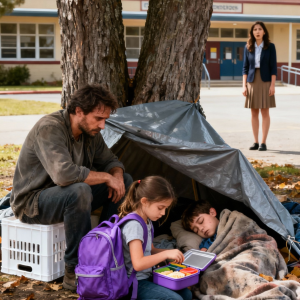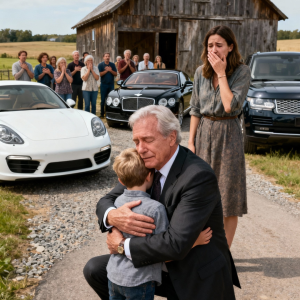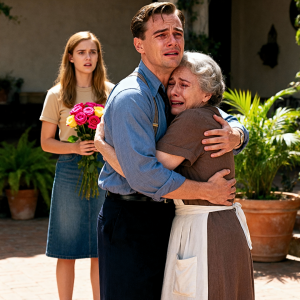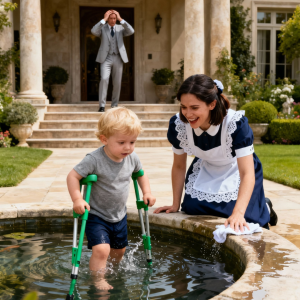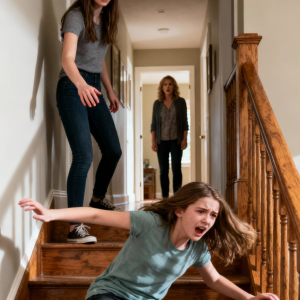
My name is Helen Strauss, thirty-five, a primary school teacher in a small Alpine town in southern Austria. My life is steady—less dramatic than novels promise, yet not without its quiet joys. There’s just one absence people never let me forget: I’m still unmarried. Friends from my youth now swap stories about children and mortgages, while my mother, before she passed, would sometimes give me a soft, worried look. I’ve always told myself I’m simply waiting for the right chapter to begin.
One late afternoon in early October, the weather turned quickly. The sky darkened, wind tugged at my coat, and then the rain came—a cold, relentless curtain. I was cycling back from school and still a couple of kilometres from my cottage. By luck, I spotted a small wooden shelter by the road, built years ago for farmers to rest.
The structure was weathered and missing a few shingles, but it kept the worst of the rain away. As I wheeled my bicycle under the roof, I noticed a lone figure approaching from the far end of the road.
He was an elderly man, stooped under a frayed coat, his steps slow. The rainwater streamed down his silver hair, plastering it to his forehead. Something about his face—the tired lines, the cautious eyes—pulled at me.
“Sir, come in out of the rain!” I called over the wind.

He hesitated only a moment before stepping in. His boots squelched, and the air around him carried the scent of wet wool and travel. He sat near the edge, as though afraid to intrude.
I rummaged through my satchel and offered him a sandwich and a thermos of tea I’d packed for work. “Please,” I said, “you must be freezing.”
He accepted slowly, but instead of eating right away, he studied me in a way that felt strangely personal. “You’re… Helen Strauss, aren’t you?” His voice trembled.
I blinked. “Yes… Have we met?”
A faint, bittersweet smile crossed his face. “I knew your mother. And… your father.”
That startled me. My mother rarely spoke of my father—only that he had died when I was an infant. No photographs, no detailed stories, just an old silver wedding band she kept in a small box.
“My father?” I asked, my voice catching.
The man—he would later tell me his name was Leonard Bruckner—nodded slowly. “We served together. In the mountains above Sarajevo during the winter of ’93. The night he di.e.d, I was there.”
The sound of the rain seemed to fade behind his words. He told me of a sudden barrage, of my father pushing him toward safety while he stayed exposed to enemy fire. “By the time I reached him,” Leonard said, “his coat was torn and he was bleeding heavily. He gave me something… asked me to bring it back to your mother. But I… I couldn’t face her. Cowardice is a heavy thing to carry.”
From his coat pocket, he drew a bundle wrapped in faded cloth. Inside was a letter—creased and yellowed with age—and a small photograph of my parents. My mother, impossibly young, was smiling beside a tall man in uniform whose eyes were my own.
I had to look away as tears blurred the edges of the photo.
The rain eased into a drizzle. Leonard asked softly, “Could you take me to your home for the night? I’ve nowhere else to go, and I think… there’s more you should know.”
I brought him to my cottage. The next hours were filled with cautious conversation. He told me he had wandered from place to place for decades, working odd jobs, avoiding the homecoming he’d promised. That night, as he sat sipping the tea I’d brewed, I realised his presence didn’t feel like that of a stranger—it was as if a missing branch of my family tree had suddenly appeared.
Two days later, he handed me another bundle—this time a small leather notebook filled with names, dates, and brief notes about men he had served with. One name stood out, written in bold: Markus Strauss – fell near Mount Trebević. Letter and photograph to be delivered to family.

For the first time in my life, I knew my father’s full name.
Leonard offered something I didn’t expect: “If you wish, I can take you to the memorial in Sarajevo. The place where his name is carved… and the hill where we last stood together.”
A month later, I took a leave of absence from school. We travelled through the mountain passes, the autumn leaves turning gold around us. At the memorial, among hundreds of etched names, I found my father’s. I placed a garland of alpine flowers beneath it and whispered, “I’ve found you at last.”
Later, Leonard led me along a narrow path to a grassy ridge. “This was the bunker site,” he said quietly. “The snow changes everything each winter, but… some places stay in your bones forever.”
I gathered a few small stones, building a tiny cairn, and lit incense I had brought from home. The smoke curled into the sharp mountain air, and behind me, Leonard brushed at his eyes.
When we returned to Austria, Leonard moved into my spare room. I began calling him “Grandfather Leo.” In the evenings, while I worked with village children on their reading, he would sit outside and tell stories—about camaraderie in bitter cold, about men who shared bread and hope in equal measure, about courage that often looked like quiet sacrifice.
I may never meet the romantic partner I once thought I needed, but I’ve gained something deeper: the truth about my roots, the place where my father rests, and the company of a man who carries the weight of memory with honour.
Sometimes, it takes nothing more than a sudden downpour to change the course of a life.
